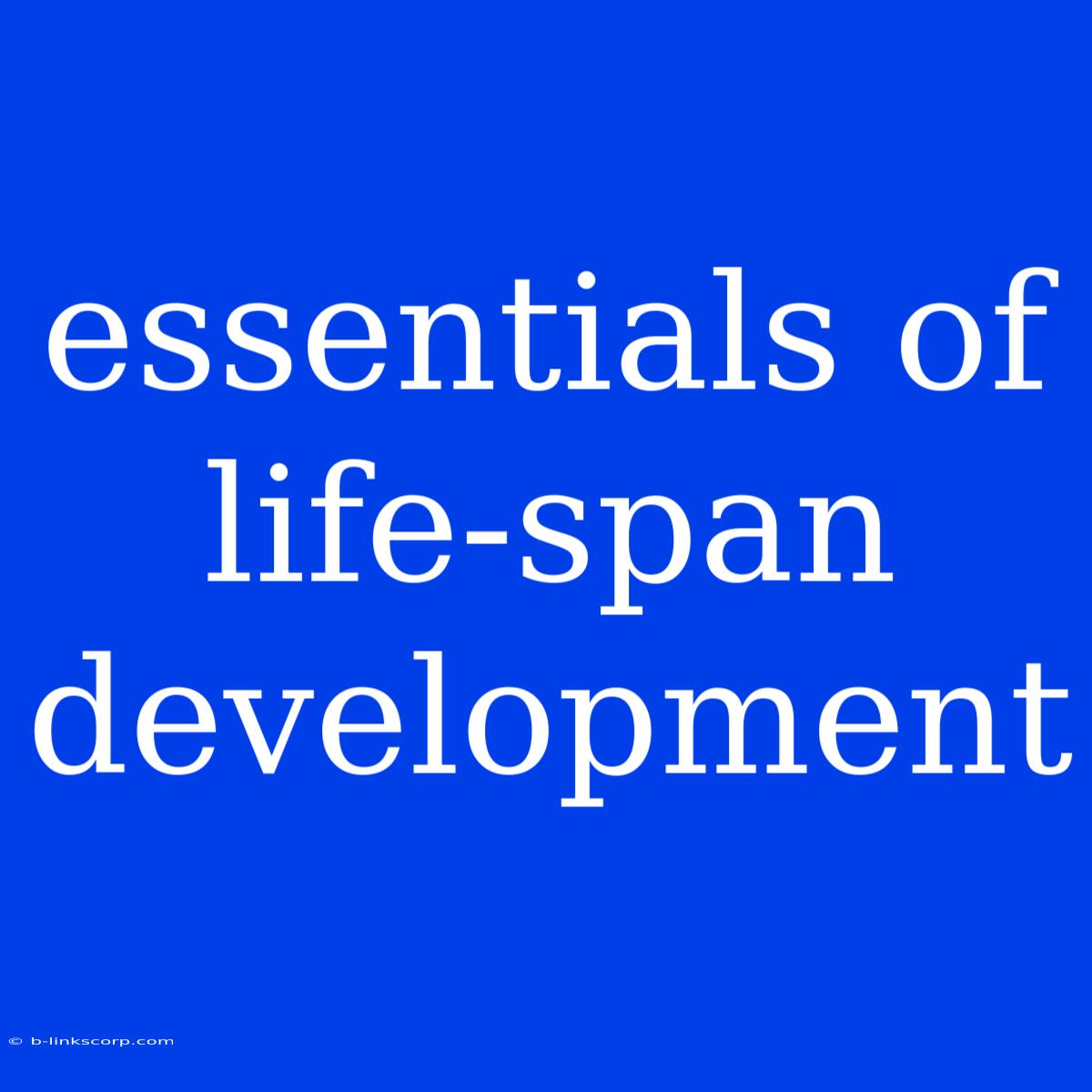The Essentials of Life-Span Development: A Journey Through the Ages
Life-span development is a fascinating and complex field that examines the various changes and transitions that individuals experience throughout their lives. From the moment we are born until our final days, we are constantly evolving and adapting to new challenges and opportunities. This journey, known as the life-span, encompasses physical, cognitive, social, and emotional development, each intertwined and shaping our overall growth.
This article will explore the essential aspects of life-span development, providing a foundational understanding of the key concepts, theories, and stages that make up this dynamic process.
Key Concepts in Life-Span Development
1. Nature vs. Nurture: This enduring debate explores the relative influence of genetic inheritance (nature) and environmental factors (nurture) on human development. While both play crucial roles, understanding their interplay is key to comprehending individual differences and developmental trajectories.
2. Continuity vs. Discontinuity: This concept focuses on the nature of developmental change. Continuity suggests gradual, incremental growth, while discontinuity proposes distinct stages with qualitatively different abilities and characteristics.
3. Universal vs. Contextual: Do developmental milestones apply universally across cultures and societies, or are they influenced by specific contexts? This debate highlights the influence of cultural norms, societal expectations, and personal experiences on development.
4. Stability vs. Change: This theme explores whether our personalities and characteristics remain relatively stable throughout life or if significant changes occur over time. While some traits may endure, others are susceptible to adaptation and transformation based on life experiences.
Major Theories of Life-Span Development
Several influential theories provide frameworks for understanding life-span development. Here are a few prominent ones:
1. Psychoanalytic Theory (Freud and Erikson): This theory emphasizes the unconscious mind and early childhood experiences in shaping personality and development. Freud's psychosexual stages and Erikson's psychosocial stages offer detailed accounts of psychological development across different life periods.
2. Cognitive Developmental Theory (Piaget): Piaget's theory focuses on how children's thinking develops through stages, progressing from concrete to abstract reasoning. His stages, such as the sensorimotor, preoperational, concrete operational, and formal operational stages, offer insights into cognitive growth and learning.
3. Sociocultural Theory (Vygotsky): This theory emphasizes the role of social interaction and culture in shaping cognitive development. Vygotsky's concepts of the Zone of Proximal Development (ZPD) and scaffolding highlight the importance of social learning and collaborative processes in development.
4. Information Processing Theory: This theory views cognitive development as a continuous process of acquiring and processing information. It emphasizes attention, memory, problem-solving, and language development as key aspects of cognitive growth.
5. Ecological Systems Theory (Bronfenbrenner): This theory posits that development occurs within a complex system of interconnected environments, including the microsystem (immediate family, school), the mesosystem (interactions between different microsystems), the exosystem (indirect influences like parents' work), the macrosystem (cultural values), and the chronosystem (historical changes).
Stages of Life-Span Development
Life-span development is traditionally divided into several stages:
1. Prenatal Development: This period encompasses the dramatic transformation from conception to birth. It is characterized by rapid growth, organ development, and the formation of the fetus.
2. Infancy and Toddlerhood (0-2 years): This stage is marked by significant physical, cognitive, and language development. Infants learn to walk, talk, and form early attachments to caregivers.
3. Early Childhood (3-5 years): Children in this stage develop more complex language skills, begin to understand social rules, and engage in imaginative play. They are also increasingly independent and self-sufficient.
4. Middle Childhood (6-11 years): This stage is characterized by significant cognitive growth, including the development of reasoning skills, moral judgment, and peer relationships. Children become more independent and engage in organized activities.
5. Adolescence (12-18 years): This is a time of rapid physical, cognitive, and social-emotional changes. Adolescents develop a sense of identity, explore relationships, and make decisions about their future.
6. Early Adulthood (18-40 years): This stage focuses on establishing oneself in work and relationships, building a family, and achieving personal goals. Career development, romantic relationships, and parenting are key themes.
7. Middle Adulthood (40-65 years): Individuals in this stage are often focused on career advancement, family responsibilities, and personal growth. They may also experience midlife transitions and challenges.
8. Late Adulthood (65+ years): This stage is characterized by physical and cognitive decline, but it also offers opportunities for reflection, wisdom, and meaningful relationships. Retirement, health challenges, and the loss of loved ones are common themes.
Conclusion
Life-span development is a continuous journey of growth, change, and adaptation. Understanding the essential concepts, theories, and stages involved in this process provides valuable insights into the human experience. By embracing the challenges and opportunities that each stage offers, individuals can live fulfilling and meaningful lives.

